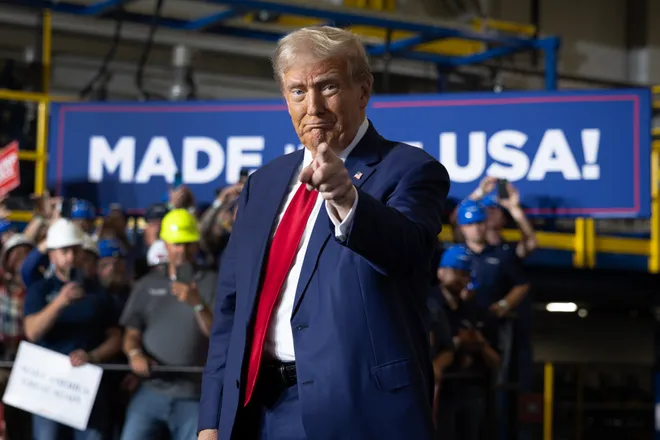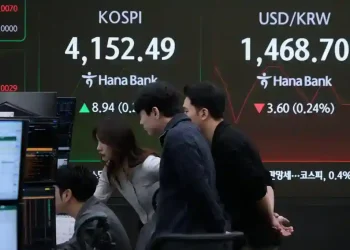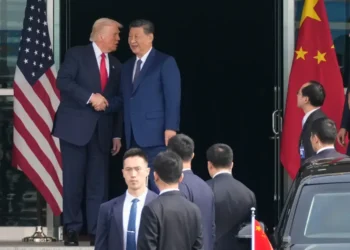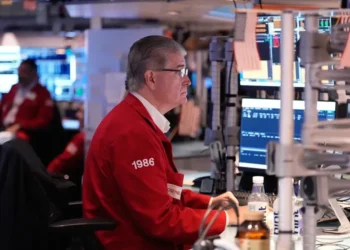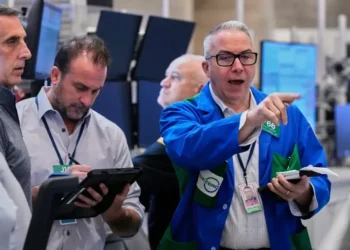Trump’s Proposed Tariffs and What They Mean for U.S. Manufacturers
Former President Donald Trump has promised a “manufacturing renaissance” if he returns to the White House, advocating for tariffs to protect and bolster U.S. companies. The goal is to raise the cost of imported goods, making American-made products more competitive. While some manufacturers welcome these measures, others and economists are concerned about the potential for rising inflation and higher interest rates.
Economic Concerns: Higher Costs and Inflation
Tariffs, which increase the price of foreign goods, can provide short-term protection for U.S. manufacturers. However, economists caution that they can also contribute to inflation, which may hurt other sectors of the economy.
Gary Schlossberg, a global strategist at Wells Fargo Investment Institute, acknowledged the protective effect of tariffs but noted that the resulting inflation could hurt manufacturers who rely on imported materials. “Depending on where you are in manufacturing, inflation could work against you,” he said.
During his first administration, Trump imposed tariffs on products like solar panels, washing machines, and certain metals. These measures were maintained by President Biden, with additional tariffs on Chinese goods. Now, Trump is proposing even more aggressive tariffs: 60%-100% on Chinese imports and a universal tariff of up to 20% on goods from other countries.
“We’ll lead an American manufacturing boom,” Trump said during a September speech in Georgia, predicting that tariffs would incentivize companies to build within the U.S.
However, these measures come at a cost. The Peterson Institute for International Economics estimates that tariffs could cost a typical American household more than $2,600 annually. According to the National Retail Federation, the tariffs could reduce American consumers’ spending power by $46 billion to $78 billion each year. For instance, a $50 pair of athletic shoes could increase to $64, and a $2,000 mattress set could rise to $2,190.
Impact on Manufacturers and Consumers
While tariffs might offer relief to some manufacturers, the rising costs could be passed on to consumers. For example, Matt Bigelow, president of Vermont Flannel, which sources fabric from Europe, expressed concern about the effect of tariffs on consumer prices, saying that inflation is already a real issue for his company.
Stephen Liquori, CEO of Goodwear USA, a Massachusetts-based apparel manufacturer, acknowledged that tariffs could level the playing field by raising the cost of imported goods. However, he questioned their long-term effectiveness, noting that some products are simply not feasible to produce domestically. “I’m realistic about that. I’m not going to say, ‘Make everything in America,’” he said.
Optimism for Jobs
Despite inflation concerns, some manufacturers are optimistic about the potential job creation that could result from expanded tariffs. Drew Greenblatt, president of Marlin Steel, a wire and sheet metal products manufacturer, believes that tariffs will bring manufacturing jobs back to the U.S. His company, which sources American steel, lost out on contracts due to lower-cost imports. “I’m going to start winning all those jobs,” Greenblatt said, predicting the need to double his staff if tariffs take effect.
A study by the Coalition for a Prosperous America suggests that a universal 10% tariff could create up to 2.8 million jobs. However, a 2020 report by the Brookings Institution found that the job gains in industries like steel were offset by losses in sectors dependent on imports or facing retaliatory tariffs.
Bayard Winthrop, CEO of American Giant, a U.S.-based apparel manufacturer, expressed support for a gradual approach to tariffs. While tariffs could boost his company, he cautioned that a sudden 20% tariff could be harmful to the economy. “The benefit is it will begin to put in place some industrial capability in the U.S. that I think is desperately needed,” Winthrop said.
Strategic Tariffs for National Security
Scott Paul, president of the Alliance for American Manufacturing, advocates for a strategic approach to tariffs, especially on Chinese products. He sees tariffs as an essential policy step to reduce the U.S.’s economic dependence on China, calling it a critical move for national security.
This article was rewritten by JournosNews.com based on verified reporting from trusted sources. The content has been independently reviewed, fact-checked, and edited for accuracy, neutrality, tone, and global readability in accordance with Google News and AdSense standards.
All opinions, quotes, or statements from contributors, experts, or sourced organizations do not necessarily reflect the views of JournosNews.com. JournosNews.com maintains full editorial independence from any external funders, sponsors, or organizations.
Stay informed with JournosNews.com — your trusted source for verified global reporting and in-depth analysis. Follow us on Google News, BlueSky, and X for real-time updates.
